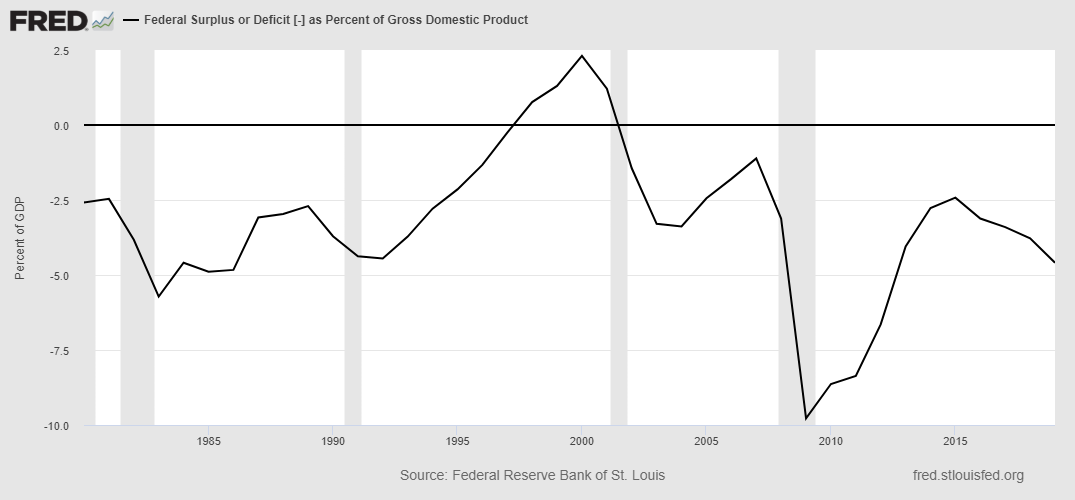With the national debt sitting within a whisker of $25 trillion, some people are becoming concerned, if not outright alarmed. Of course, people were alarmed when it hit $20 trillion, $15 trillion, $10 trillion… you get the idea. Images of Weimar Germany spring to mind, and inflation run riot, but it hasn’t happened yet and it probably won’t. So, should we worry? The answer is “Yes … but.”
Debt could go even higher without harming the economy or the dollar, although that doesn’t mean we should allow it without limits, and the good news is we don’t have to lessen it by next week. First, some clarification: People conflate “debt” with “deficit.” The “debt” is the accrual of previous deficits, where we failed to collect enough revenue to cover spending in a given fiscal year. So then if you want to put a dent in the debt level, you must first eliminate the deficit by collecting more than we spend, which gives us a surplus for that year. The last time we ran a surplus was from 1998 to 2001. We actually stopped issuing 30-year Treasuries. There was no need to raise money in the public markets to cover operating expenses.
With the current deficit close to $800 billion and a negative GDP economy, it is a safe to assume debt will rise to still greater heights. Recessions obliterate revenue. We missed the opportunity to keep a lid on this when the economy recovered, and should have raised taxes instead of cutting them, especially for people who didn’t need any tax relief.
So, what to do? First, is to raise taxes, and aggressively. Some people say this will hurt the economy, but tax cuts have never benefited the economy as much as people think. The myth began when Ronald Reagan cut marginal rates in his first term, and the economy recovered. But tax cuts didn’t revive the economy: Fed Chair Paul Volcker did, by dropping the Fed Funds rate by around 1000 basis points. Any president could have “succeeded” with that kind of tailwind, but the myth remains. History shows Fed policy is a far greater driver of economic fortunes than tax policy.
Debt is a net credit to the economy at large, so in that respect it has some stimulative value. However, people forget one hidden truth: Taxes are not about revenue. They’re about distribution. They’re about who gets to keep what in this giant economy of ours.
Tax policy has been so upwardly distributive over the past decades, it’s one reason there has been no inflation. Asset prices rise, but labor is now effectively taxed at three times the rate of capital. This dynamic’s biggest cheerleaders are the ones who say they value hard work the most, while they expense pages of deductions on their tax returns, giving them a lower effective tax rate than a hallway janitor.
So, what to do? Marginal rates should be raised, as well as rates on capital gains. What concerns me is that Biden’s tax proposals are quite modest as far as increases go. The top rate gets hiked from 37 percent to the old 39.6 percent rate. That should be kicked up.
Corporate rates would be raised to 28 percent under the Biden plan, which is essentially Obama’s proposal. (The effective corporate rate was always around 25 percent, even before the Trump cuts.) The big problem here is that 40 percent of U.S. corporate profits are domiciled in overseas tax havens. That has to be attacked, and vigorously. One needed change is that payroll taxes to fund Social Security and Medicare are reinstated for those reporting over $400,000 a year for both employer and employee. But I’m not sure how keeping it for the poor while exempting it for those who earn between $137,700 and $400,000 makes any sense. But if you want those suburban votes….
However, it is a platform in an election season and it still has to get through Congress, where anything can happen. But the one thing that drives deficits down the most is a broad-based, robust economy. All post-WWII data proves this. We have a tough slog ahead of us, and the sad thing is it’s mostly self-inflicted. I wonder if this country will ever be happy again.
Donald Davret
Roslyn



